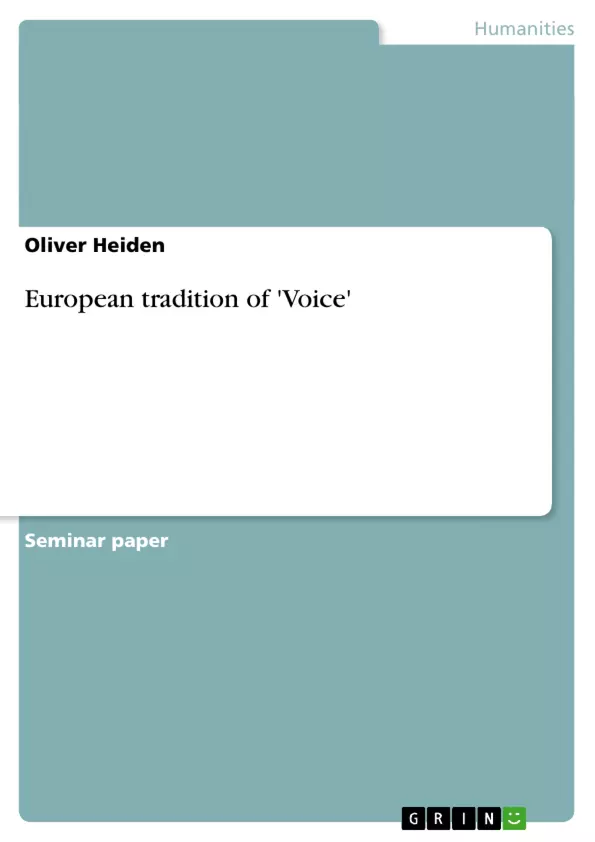Since the Rhine-model of capitalism seems to have worldwide launched into a gradual disintegration there emerged an unending discussion in social sciences offering different predictions with regard to the future direction coordinated national economies (CMEs) may take. In this debate the German case attracted an outstanding amount of attention. The expected outcomes of the German economy’s distinct move towards a much more market-orientated coordination of its activities vary widely. Most contributions on this topic base their predictions on contemporary economical and political features influencing the German capitalism and disregard deep-rooted historical traditions. However, traditional German ideology and practice may have an affect on national economical behaviour. The first purpose of the present paper is to complement existing studies with the general idea that new findings may emerge by tracing back diverse models of capitalist organisation to nations’ varying traditional patterns of behaviour. The assumption is that distinct traditional attitudinal preferences in societies have promoted market minded behaviour differently across nations and have inspired, thus, different types of market economies. (In order to define fundamental differences in national ideology and practice I will refer to Hirschman’s concept of exit and voice.) The second goal is to reject significant convergence of the German economy to the Anglo-American sort of liberal market capitalism.
Inhaltsverzeichnis (Table of Contents)
- Introduction
- Hirschman's concept of Exit and Voice
- American vs. European Ideology and Practice
- Exit and Voice in Liberal and Coordinated Market Economies
- Innovation and the Value of diversity
- Conclusions with regard to the German case
- References
Zielsetzung und Themenschwerpunkte (Objectives and Key Themes)
This paper aims to complement existing studies on the German economy by investigating the influence of traditional patterns of behavior on the evolution of capitalist organization. It seeks to demonstrate that distinct traditional attitudinal preferences across nations have contributed to diverse types of market economies. The paper aims to reject the notion of complete convergence of the German economy towards the Anglo-American model of liberal market capitalism, highlighting the role of traditional ideologies in maintaining the persistence of diverse capitalist structures.
- The impact of traditional ideology and practice on national economic behavior
- The role of Hirschman's exit and voice framework in understanding the differences between liberal and coordinated market economies
- The persistence of traditional CME values in the context of globalization and innovation
- The concept of "functional conversion" and the emergence of hybrid models of capitalism
- The significance of the German case in the context of global economic trends
Zusammenfassung der Kapitel (Chapter Summaries)
- Introduction: This chapter provides a brief overview of the debate surrounding the future direction of coordinated national economies (CME) and highlights the specific case of Germany as a prime example of CME. It introduces the paper's primary objective: to explore the role of traditional ideology and practice in shaping the German economy.
- Hirschman's concept of Exit and Voice: This chapter explores Hirschman's theory of exit and voice, which posits that slack in economic systems is a natural phenomenon and that recuperation mechanisms are necessary to prevent decline. The chapter argues that this theory provides a useful framework for understanding the differences between liberal and coordinated market economies.
- American vs. European Ideology and Practice: This chapter examines the ideological and practical differences between the American and European models of capitalism, focusing on the contrasting approaches to market coordination and regulation.
- Exit and Voice in Liberal and Coordinated Market Economies: This chapter explores the application of Hirschman's framework to liberal and coordinated market economies, highlighting the distinct roles of exit and voice in each system.
- Innovation and the Value of diversity: This chapter examines the role of traditional CME values in the context of innovation and the global economy, arguing that diversity in economic systems can be a source of competitive advantage.
Schlüsselwörter (Keywords)
The paper centers around the core concepts of coordinated market economies (CME), liberal market economies (LME), Hirschman's exit and voice framework, traditional ideology, functional conversion, innovation, and the role of diversity in the global economy. The focus is on examining the evolution of the German economy and its historical context, highlighting the interplay between traditional values and contemporary economic trends.
Frequently Asked Questions
What is the "Rhine-model" of capitalism?
It refers to the coordinated market economy (CME) typical for Germany, characterized by long-term relationships and social partnership.
What is Hirschman's concept of 'Exit and Voice'?
'Exit' refers to leaving a relationship (market-oriented), while 'Voice' refers to attempting to change a situation through communication and participation.
Is the German economy converting to the Anglo-American model?
The paper argues against complete convergence, suggesting that traditional German ideologies and practices maintain the distinctiveness of its CME structure.
How do historical traditions affect national economic behavior?
Deep-rooted attitudinal preferences in societies promote different types of market behavior and influence how nations coordinate their economic activities.
What is "functional conversion"?
It describes how existing institutions adapt to new economic pressures without completely losing their traditional characteristics, leading to hybrid models.
- Quote paper
- Dipl.-Volkswirt (BA) Oliver Heiden (Author), 2007, European tradition of 'Voice', Munich, GRIN Verlag, https://www.grin.com/document/75421



